
L. to R.: Former Pennsylvania House Democratic Whip Mike Veon; Pennsylvania Representative Bill DeWeese
Pennsylvania has long been known for shady politics, but this year promises to be particularly ugly as series of corruption trials unfold, all stemming from a sweeping probe known as "Bonusgate." Prosecutors charge that leaders of both parties in the state House of Representatives flagrantly ignored the law, using taxpayer money to wage political warfare and to lavish perks on aides and party loyalists. The price tag is likely in the tens of millions, and prosecutors warn there could be more indictments, possibly targeting leaders of the State Senate. "There was an unbelievable sense of entitlement in Harrisburg that they could do this with a high degree of immunity," said Chris Borick, political science professor at Muhlenberg College.
On Tuesday a state court will begin picking a jury in the trial of former House Majority Whip Mike Veon, a Democrat from western Pennsylvania, and three former party staffers, who are accused of running a secret campaign office in the Capitol building. The defendants are among 25 people from both parties indicted by state Attorney General Tom Corbett, who started the investigation three years ago, initially focusing on taxpayer money used to give bonuses to Democratic staffers working on campaign projects on official time.
The scandal has since spread across the legislature, involving not just Democrats but also Republican efforts to use expensive computer programs, bought with state funds ostensibly to help legislators improve their constituent service, to instead help loyal candidates perform detailed data-mining operations for their campaigns.
Although the parties ran their schemes separately, according to the indictments, "the goal was the same: power and using public resources for campaign purposes," Corbett's spokesman Kevin Harley said. So far, the probe has indicted some big names in addition to Veon, including two former House Speakers, Democrat Bill DeWeese and Republican John Perzel, and the former chairman of the House Appropriations Committee, Brett Feese, a Republican from Williamsport. The scandal forced the resignation of state Revenue Secretary Stephen Stetler, who was indicted in December for his role in the scheme while a legislator and head of the House Democratic Campaign Committee.
The scandal has shaken up the looming race to replace Democratic Gov. Ed Rendell, who is term-limited from seeking re-election. Attorney General Corbett has long been seen as the Republican front-runner, but his investigations have earned him enemies in both parties and led to criticism that he is grandstanding for electoral purposes. "This is a prosecution which has as its foundation the desire of the Attorney General of Pennsylvania to be governor," said Joel Sansone, one of Veon's attorneys, who asserts that his client is innocent. "The conduct itself is not illegal ... What they did is done every day in every statehouse in the United States." Sansone has said that Veon's defense team will introduce evidence that the attorney general himself and his staff often blur the lines between campaign work and official duties.
Despite all the publicity the indictments have generated for Corbett, the anti-corruption campaign got off to an inauspicious start. The first trial, in December, resulted in the acquittal of former Democratic lawmaker Sean Ramaley, who had been charged with having a do-nothing political job with Veon while Ramaley was running for office. Prosecutors say that they have a far stronger case against Veon and the other legislative leaders. Seven legislative aides pleaded guilty to related charges earlier this month and are expected to testify against Veon and others.
With so many legislators indicted in the most sweeping Pennsylvania political scandal in decades, Bonusgate has left a yawning power vacuum in the 253-seat General Assembly, with neither the governor nor party leaders able to take charge of key legislation. The most striking example was the bruising fight over the new state budget, which dragged on more than 100 days past its deadline. The budget finally passed in October left nobody satisfied, balancing the books by cutting state services, raising several taxes, opening state park land to gas drilling and greatly expanding the state's controversial gambling law.
Whether this debacle will translate into change at the ballot box is hard to tell, said pollster Terry Madonna of Franklin & Marshall College. Surveys show voters are shocked by the legislative mess, he said, but it's not clear that they are angry and motivated for change. The scandal, he said, "has led to a good bit of cynicism, a good bit of distrust — and almost despair."
